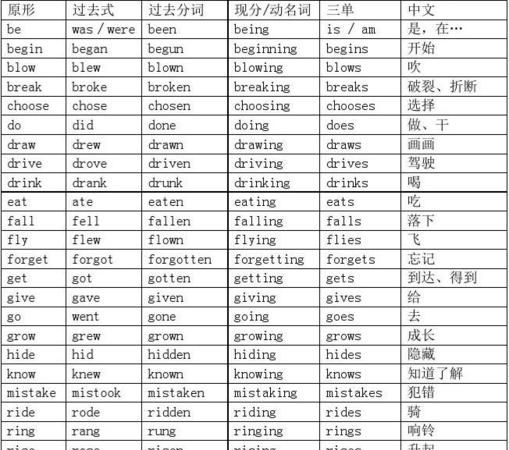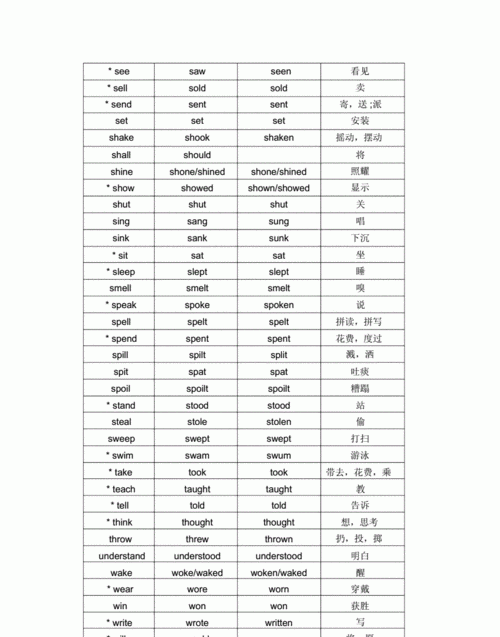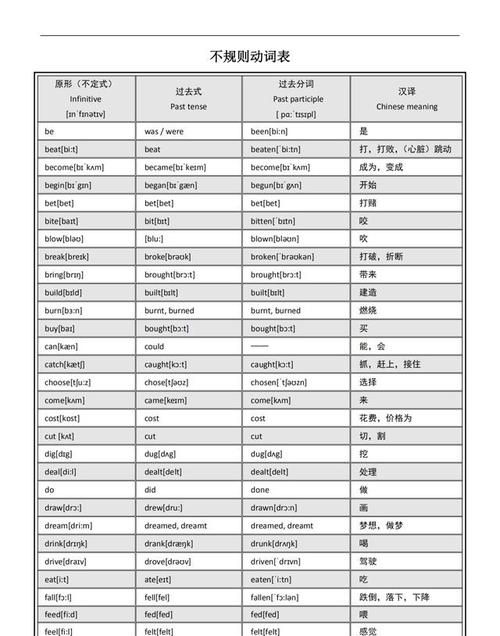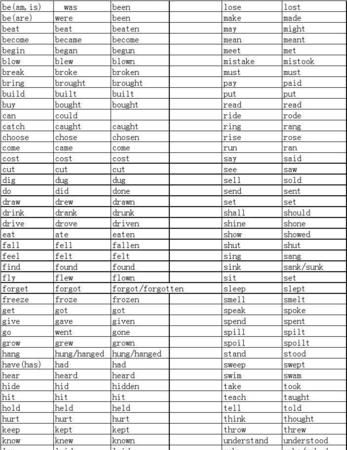本文目录
初中英语常用不规则动词表
学好了动词,就相当于学好了英语。的确是这样,英语动词在初中阶段可谓举足轻重。那么接下来给大家分享一些关于初中英语常用的动词用法,希望对大家有所帮助。
初中英语常用动词用法:
1. allow sb. to do sth. 允许某人去做某事
My father allowed me to go out for a walk after finishing my homework.
2. asked sb. (not) to do sth. 叫某人做事某事(叫某人不要去做某事)
My father asked me to study hard.He asked me not to swim alone.
be asked to do sth. 被叫去做某事/被邀请去做某事
I was asked to have a dinner with them yesterday.
3. be afraid to do sth. 害怕做某事She is afraid to ask me questions.
4. be afraid of doing sth. 害怕做某事I am afraid of going out at night.
5. be afraid of sth. 害怕某物He is afraid of snakes.
6. be amazed to do sth. 对做某事感到惊讶He was amazed to meet the girl there.
be amazed at sth. 对某事感到惊讶they were amazed at the news
7. be busy doing/with sth. 忙于做某事 (常考)
e.g: I was busy washing my car at that time. 那时候我正忙于清洗我的车子。
I am busy with my work.
8. be coming/going/leaving/flying/moving/dying(某些位移动词用进行时态时表将来)
the bus is coming/the dog is dying.
9. be excited to do sth. 对做……感到兴奋
Jacky was excited to travel there by plane.
be excited at sth.
Lily was excited at his words.
be excited about doing sth.
he was excited about passing the exam without going overing books.
10. be frightened to do sth. 害怕去做某事
Sam is frightened to ride a horse.
11. be glad/happy to do sth. 高兴去做某事
she is happy to clean the blackboard with me.
be pleased to do sth. 高兴做某事
she was pleased to help the old man yesterday
be pleased with sth. 对某事感到高兴/满意
the teacher was pleased with my answer.
12. be interested in sth./doing sth. 对某事感兴趣/对做某事感兴趣
she is interested in swimming in the river.
My brother is interested in Chinese.
13. be/get ready for/to do sth.Be ready for sth. 为某事做好了准备
We are ready for the exam.Be ready to do sth. 为做某事做好了准备
We are ready to have a birthday party for her.
get ready for sth.为某事在做准备
We are getting ready for the exam.
13. be sorry to do sth. 对做某事感到抱歉
14. be surprised to do sth. 对做某事感到惊奇
be surprised at sth. 对某事感到惊奇
15. be worth doing sth. 值得做某事 (worth 后接动词-ing形式,常考)
16. begin to do sth.begin/start to do/doing sth.
17. can/be able to afford (to buy) sth. 有能力购买(供)……
18. can/may/must do sth. could/would/should/might do sth.
19. can't wait to do sth. 迫不急待地去做某事
20. decide to do sth. 决定去做某事
make up one's mind to do sth. 下决心去做某事 (常考)
make a decision to do sth. 对做某事作出决定
21. deserve to do sth. 值得/应该做……
22. encourage sb. to do sth.鼓励某人去做某事
23. enjoy doing sth. 乐意去做某事
24. expect (sb.) to do sth. 期望去做某事
25. fail to do sth. 做某事失败succeed doing sth. 成功做了某事
26. finish doing sth. 做完某事(后接动词-ing形式) (常考)
27. follow sb to do sth. 跟随某人去做某事
28. get sb. to do sth.make sb. do sth.let sb. do sth.
29. get/have a chance to do sth.得到一个做某事的机会
30. give/pass/show/lend/sell sb. sth./ sth. to sb.buy/get/bring sb. sth. / sth. for sb.
31. go on to do sth. 继续做事(常考)
go on doing sth. 继续做事(常考)
32. hate to do/doing sth. 讨厌/不喜欢做某事
33. have fun doing sth.
34. have problems doing sth.做某事遇到困难
35. have sb. do sth.have sth. donehave sth. to do 有事要做
36. hear sb. do sth. 听到某人做某事(后接动词原形,常考)hear sb. doing sth. 听到某人正在做某事(常见)
37. help to do sth. 帮忙做某事help sb. (to) do sth. 帮助某人做某事
38. hope/wish to do sth. 希望做某事wish sb. to do sth. 希望某人做某事
39. I t seems that 这像是……(后接从句)seem to do sth.seem +adj.
40. It's + adj.+(for sb.) to do sth.
It's + adj. +(of sb.) to do sthe.g: It's glad for him to hear the news.
41. It takes sb. some time/money to do sth. 花费某人多长时间做某事(常考)
42. pay …for…costspend…on…..it take …to do sth.
43. It's best for sb to do sth.. 对某人来说做某事是最好的
had better do sth. 最好做某事 (注意had没有时态和人称的变化,better后接动词原形)
44. It's time for sb. to do sth. 是某人做某事的时候了
45. keep (on)doing sth. 坚持做某事(常考)keep sb. doing sth. 让某人做某事(常考)
keep sb. from doing sth. 阻止某人做某事(常考)keep sb./ sth. +adj.
keep the book for 2 days 借这本书两天(不要用borrow或lend)
46. learn to do sth. 学做某事learn sth. from sb. 向某人学习
47. like to do/doing sth. 喜欢做某事like sb. to do sth. 喜欢某人做某事
48. need to do sth.need doing sth./to be doneneed sth .needn't do sth.
49. prefer to do sth. rather than do sth. 宁愿……而不愿……(常考)
prefer doing sth. to doing sth. 喜欢做……胜过做……
e.g: I prefer reading books to going shopping. 比起购物来,我更爱读书。
prefer to do sth. 喜欢(爱)做某事
50. refuse to do sth. 拒绝做……
初中英语动词固定搭配:
1. want to do sth. 想要做某事
I want to buy a new computer this afternoon.
我想今天下午买台新电脑。
2. would like to do sth.想要做某事
I would like to invite you to come to my birthday party this Saturday.
我想邀请你这周六来我的聚会。
3. wish to do sth. 希望做某事
I wish to live on the moon one day.
我希望有一天在月球上生活。
4. help to do sth. 帮助做某事
I often help to do some chores at home.
我在家经常帮着做家务。
5. hope to do sth. 希望做某事
I hope to have a good rest this weekend.
我希望这周末好好休息一下。
6. learn to do sth. 学会做某事
He finally learned to play the piano with the help of the teacher.
在老师的帮助下,他最终学会了弹钢琴。
7. manage to do sth. 设法做成某事
They managed to escape the fire yesterday.
昨天他们设法逃脱了火灾。
8. offer to do sth. 主动提出做某事
Never offer to teach fish to swim.
别在强人面前逞能。
9. plan to do sth. 计划做某事
He plans to travel around the world.
他计划要周游世界。
10. afford to do sth. 负担得起做某事(时间或金钱方面)
We can’t afford to go abroad this summer.
今年夏天我们没有足够的钱 出国 。
11. agree to do sth. 做某事
He agreed to do it at once.
他同意立刻行动。
12. arrange to do sth.安排做某事
I arrange to wash clothes tomorrow morning.
我安排好明天上午洗衣服。
13. ask to do sth. 要求做某事
The boy asks to go to school by bike.
这个男孩要求骑自行车去上学。
14. beg to do sth. 恳求做某事
He begged not to be put into prison.
他祈求不要被关进监狱。
15. care to do sth. 愿意/喜欢做某事
16. choose to do sth. 选择做某事
He chose to believe what she had said.
他选择相信她说的话。
17. decide to do sth. 决定做某事
She has decided to travel all over the world.
她已经决定周游世界了。
18. demand to do sth. 要求做某事
19. determine to do sth. 决心做某事
He determined to learn French.
他下定决心学习法语。
20. expect to do sth. 等待做某事
I am expecting to hear from you soon.
我期待着早点收到你的来信。
21. fear to do sth. 惧怕做某事
She fears to live on the mountain.
她害怕住在山上。
22. prepare to do sth. 预备做某事
They prepared to go hiking this Sunday.
他们准备周日去远足。
23. pretend to do sth. 伪装做某事
She pretended not to see me.
她假装没有看到我。
24. promise to do sth. 答应做某事
I have promised to give the children some books.
我已经答应给孩子们一些书了。
25. refuse to do sth. 拒绝做某事
She refused to buy a new cellphone for her boy.
她拒绝给她儿子买新手机。
初中英语常用动词注意事项:
一、主动表被动的情况
1. 感观系动词,look, seem, sound, feel, smell, taste等
eg. The fish tastes nice.
2. measure, weigh等表示度量的动词。
eg. The elephant weights nearly a ton.
3. wash, clean, open, sell, read, last, write, steer等不及物动词可以表示被动意义。eg. The ship steer easily.
二、被动句表示主动含义。
She was dressed in a red skirt.
此类动词常见于dress, seat, devote, adapt, accustom 等后面可以接反身代词的动词。
二、时态,语态
1. 用进行时表示一种情绪。
She is always helping others.(表赞扬)
The man is always smoking in the office, which offends others very much.
2. 一般过去时表示某一动作已完成,过去进行时表示动作可能未完成。
He wrote a letter yesterday morning.(信已写完)
He was writing a letter yesterday evening. (信可能还未写完)
3.现在完成时可表示动作持续至今,一般过去时则表示动作已结束,并不强调对现在造成的影响或结果。
I have lived in this street.(我一直住这条街上)
I lived in this street.(我曾住在这条街上)
4.表示几个连续动作时,尽管有先后,仍要用相同时态。
He came into the classroom, put down the book and wrote a few words on the blackboard.
5. 在条件和时间状语从句中常用一般时表示将来。
6.叙述过去发生的某件事情常用一般过去时,表示过去某个时间或动作之后发生的事情才用过去将来时,过去某个时刻/段内正发生的事情,才用过去进行时,过去某个时间或动作之前发生的事情才用过去完成时。因此找准时间的参照点,是正确运用时态的关键。
7.罗列并熟记各种时态的被动形式。
三.动词的类别与特征中的注意点
1.兼作Vt., Vi.的动词
(1)对兼作Vt., Vi.的动词,要注意根据不同的情况选择使用。
The children are flying their kites in the square.( Vt.)
We saw a plane flying high up in the sky.( Vi.)
(2)有些动词后跟从句时为Vt., 其它 情况为Vi.,但意义基本不变。典型的有wonder, think, insist, agree,等。
The headmaster insisted that the students should wear school uniforms .
The headmaster insisted on the students wearing school uniforms.
(3)有些动词在Vt. Vi.之间,意义有所不同。如run, stand, lie等
She stood alone under the tree.
I can’t stand such cold weather.
2.常用的双宾动词有give, teach, lend, bring, explain, send, offer, pay, sell, buy, tell, show, write, ask, wish, read等,这些动词都带有一定的趋向性。因此转换成带介词的情况时,常可用for , to 来转换。
注意:explain sth. to sb.=explain to sb. sth., describe sth. to sb.=describe to sb. sth.
3.带宾补的动词,注意宾补的逻辑主语是动词宾语
宾补常是名词、形容词、介词 短语 ,副词和非谓语动词等。常见的此类动词有make, have, let, get, keep, find, see, feel, notice等,但要注意不同的动词有不同的接法。
He kept the children (keep不能用不定式作宾补)
Make…do, have…do/doing/done,get…to do/done, find…doing/done, leave…to do/doing/介词短语/a./ad., see…doing/do/done
4.后面常接-ing的动词及短语:suggest, finish, avoid, can’t help, mind, need, enjoy, require, postpone, delay, practice, fancy, excuse, pardon, advise, consider, deny, admit, endure, escape, miss, appreciate, dislike, have a good time doing, put off, call off, give up
5.有些动词后面接to do 和-ing时意义基本相同,而有的则完全不同,要注意
Love, like, hate, forget, remember, stop, begin, start, continue, prefer, regret, intend, mean, want, need, require, neglect, try, deserve, can’t bear等
6.注意状态动词和动态动词的选用
Mother asked the son to notice his manners at the party. (notice就改为mind)
再如:listen/hear, look/see, look for/find, advise/persuade, marry/be married, join/be in等。
7.注意have表“有”时,及系动词一般不能用进行时态。
8.注意表示“有”时,have与there be 的选用
9.注意动词词组分类(见<零距离>),尤其要注意各类动词词组的使用特点及有的动词词组的主被动转换使用。
Make use of sth→sth is made use of(介词不要掉了)/use is made of sth.
10.Hope, intend, expect, plan, want, think, mean 等动词用过去完成时表示没有实现的愿望,计划,打算等
初中英语常用的动词用法相关 文章 :
★ 初中英语动词的知识点总结
★ 初中英语动词知识点:Be动词定义及用法
★ 初中英语常用词组有哪些?以及它们的用法是?
★ 初中英语中的常见语法
★ 初中英语语法专题代词与常用动词
★ 初中英语必须掌握的19个重点语法知识点
★ 初中英语情态动词的用法归纳
★ 初中英语动词短语大全
★ 初中英语语法专题动词语常用短语

初中英语重点动词短语
常用英语动词短语
(一)由be构成的词组
1)be back/in/out 回来/在家/外出
2)be at home/work 在家/上班
3)be good at 善于,擅长于
4)be careful of 当心,注意,仔细
5)be covered with 被……复盖
6)be ready for 为……作好准备
7)be surprised (at) 对……感到惊讶
8)be interested in 对……感到举
9)be born 出生
10)be on 在进行,在上演, (灯)亮着
11)be able to do sth. 能够做……
12)be afraid of (to do sth. that…) 害怕……(不敢做……,恐怕……)
13)be angry with sb. 生(某人)的气
14)be pleased (with) 对……感到高兴(满意)
15)be famous for 以……而著名
16)be strict in (with) (对工作、对人)严格要求
17)be from 来自……,什么地方人
18)be hungry/thirsty/tired 饿了/渴了/累了
19)be worried 担忧
20)be (well) worth doing (非常)值得做……
21)be covered with 被……所覆盖……
22)be in (great) need of (很)需要
23)be in trouble 处于困境中
24)be glad to do sth. 很高兴做……
25)be late for ……迟到
26)be made of (from) 由……制成
27)be satisfied with 对……感到满意
28)be free 空闲的,有空
29)be (ill) in bed 卧病在床
30)be busy doing (with) 忙于做……(忙于……)
(二)由come、do、get、give、go、have、help、keep、make、looke、put、set、send、take、turn、play等动词构成的词组
1)come back 回来
2)come down 下来
3)come in 进入,进来
4)come on 快,走吧,跟我来
5)come out出来
6)come out of 从……出来
7)come up 上来
8)come from 来自……
9)do one's lessons/homework 做功课/回家作业
10)do more speaking/reading多做口头练习/朗读
11)do one's best 尽力
12)do some shopping (cooking reading, cleaning)买东西(做饭菜,读点书,大扫除)
13)do a good deed (good deeds)做一件好事(做好事)
14)do morning exercises 做早操
15)do eye exercises 做眼保健操
16)do well in 在……某方面干得好
17)get up 起身
18)get everything ready 把一切都准备好
19)get ready for (=be ready for) 为……作好准备
20)get on (well) with 与……相处(融洽)
21)get back 返回
22)get rid of 除掉,去除
23)get in 进入,收集
24)get on/off 上/下车
25)get to 到达
26)get there 到达那里
27)give sb. a call 给……打电话
28)give a talk 作报告
29)give a lecture (a piano concert)作讲座(举行钢琴音乐会)
30)give back 归还,送回
31)give……some advice on 给……一些忠告
32)give lessons to 给……上课
33)give in 屈服
34)give up 放弃
35)give sb. a chance 给……一次机会
36)give a message to…… 给……一个口信
37)go ahead 先走,向前走,去吧,干吧
38)go to the cinema 看电影
39)go go bed 睡觉(make the bed 整理床铺)
40)go to school (college) 上学(上大学)
41)go to (the) hospital 去医院看病
42)go over 过一遍,复习/ go over to 朝……走去
43)go fishing/skating/swimming/shopping 去钩鱼/滑冰/游泳/买东西
44)go home (there) 回家去(去那儿)
45)go round 顺便去,绕道走
46)go up 上去
47)go out for a walk 外出散步
48)go on (doing) 继续(做……)
49)go on with one's work 继续某人的工作
50)go upstairs/downstairs 上/下楼
51)(the lights) go out (灯)熄了
52)have a lesson (lessons)/a meeting 上课/开会
53)have a football match (basketball match) 举行一场足球(蓝球)赛
54)have dictation 听见
55)have a try 试一试
56)have a good/wonderful time 玩得很高兴
57)have a lecture (a piano concert) 听讲座(听钢琴音乐会)
58)have a report (talk) on 听一个关于……的报告
59)have a glass of water (a cup of tea) 喝一杯水,(一杯茶)
60)have breakfast/lunch/supper 吃早饭/午饭/晚饭
61)have a meal (three meals) 吃一顿饭(三餐饭)
62)have a dinner 吃正餐
63)have bread and milk for breakfast 早饭吃面包和牛奶
64)have (have got) a headache 头痛
65)have a fever 发烧
66)have a cough (a cold) 咳嗽(感冒)
67)have a look (at) 看一看……
68)have a rest (a break) 休息一会儿(工间或课间休息)
69)have a talk 谈话
70)have a swim/walk 游泳/散步
71)have sports 进行体育锻炼
72)have a sports meet (meeting) 开运动会
73)have something done 让人(请人)做……
74)have a test/an exam 测验/考试
75)have an idea 有了个主意
76)had better do sth. (not do sth.) 最好做……(最好不要做……)
77)have a word with 与……谈几句话
78)help sb. with sth. help sb. do sth. 在……方面帮助…… 帮助……做
79)help oneself to some chicken/fish/meat 请随便吃点鸡/鱼/肉
80)help each other 互相帮助
81)keep up with 跟上……,不落后于……
82)keep silent/quiet 保持沉默/安静
83)keep sb. doing sth. 使……一直做……
84)keep one's diary 记日记
85)make a noise (a lot of noise, much noise, noises)吵闹(十分嘈杂,响声)
86)make a living 谋生
87)make sb. do sth. 迫使某人做……
88)make faces (a face)做鬼脸
89)make friends (with)与……交朋友
90)make a mistake (mistakes)犯错误
91)make room/space for 给……腾出地方
92)make a sentence (sentences)with 用……造句
93)make a fire 生火
94)be made from/of 由……制成
95)be made in 在……地方制造
96)look out of (outside) 往外看(看外面)
97)look up a word (in the dictionary) 查字典
98)look up 往上看,仰望
99)look after 照管,照看,照顾
100)look for 寻找
101)look like 看上去像
102)look fine/well/tired/worried 看起来气色好/健康/疲劳/忧虑
103)look out 当心,小心
104)look on …as… 把……当作……看待
105)look around 朝四周看
106)look at 看着……
107)put on 穿上(衣服),戴上(帽子),上演(戏剧)
108)put up 建造,搭起,挂起,举起,张帖
109)put into 使进入,输入
110)put one's heart into 全神贯注于
111)put…down… 把……放下
112)put…into… 把……译成
113)set up 竖起,建起
114)set off 出发,动身
115)set out 出发
116)set an example for 为……树立榜样
117)send for 派人去请(叫)
118)send out 放出,发出
119)end up 把……往上送,发射
120)take one's advice 听从某人劝告
121)take out 拿出,取出
122)take down 拿下
123)take place 发生
124)take one's place 坐……的座位,代替某人职务
125)take the place of 代替……
126)take a walk/rest 散步/休息
127)take it easy 别紧张
128)take sth.with sb. 随身带着
129)take sb. to a park/London for one's holidays 带某人去公园/伦敦度假
130)take care of 关心,照顾,保管
131)take a look (a last look) at 看一看(最后看一眼)
132)take an exam 参加考试
133)take away 拿走
134)take back 收回,带回
135)take hold of 抓住……
136)take off 脱下(衣,帽,鞋等)拿掉
137)take (an active) part in (积极)参加(活动)
138)take photos 拍照
139)take some medicine 服药
140)take a bus/train, boat/ 乘公共汽车,火车/船
141)turn on 开,旋开(电灯,收音机等)
142)turn off 关上(电灯,收音机等)
143)turn in 交出,上交
144)turn…into… 变成
145)turn to 翻到,转向
146)turn down (把音量)调低
147)turn…over 把……翻过来
148)play basketball 打篮球,football 踢足球,volleyball 打排球
149)play games 做游戏
150)play the piano (the violin) 弹钢琴(拉小提琴)
151)play with snow 玩雪
152)play a joke (on) 对……开玩笑
(三)由其他动词构成的词组
153)think over 仔细考虑
154)arrive at/in a place 到达某处
155)eat up 吃完,吃光
156)do well in 在……干得好
157)enjoy doing sth. like doing sth. 喜欢做某事 喜欢干某事
158)find out 发现,查出(真相等)
159)finish off 吃完,喝完
160)stop doing sth. 停止做某事
161)stop to do sth. 停下来去做某事
162)hold a meting 举行会议
163)hold up 举起
164)hurry up 赶快,快点
165)enter for 报名参加
166)langht at 嘲笑
167)be used to 习惯于
168)used to 过去常常
169)wake…up 唤醒
170)work out 算出
二、动词短语
1)ask for 向……要……,请求
2)ask for leave 请假
3)send for 派人去请(叫)
4)pay for 付……的款
5)wait for 等候
6)thank for 为……感谢
7)apologize to sb. for sth. 为某事向某人道歉
8)look for 寻找
9)leave…for 离开……去……
10)fall off 跌落
11)catch cold 着凉,伤风
12)catch up with 赶上
13)agree with sb. 赞成,同意某人的意见
14)filled……with 把……装满
15)tell sb. about sth. 告诉某人某事
16)talk about 谈论……
17)think about 考虑……
18)worry about 担忧……
19)look after 照料
20)run after 追赶,跟在后面跑
21)read after 跟……读
22)smile at 对……微笑
23)knock at 敲(门、窗)
24)shout at 对……大喊(嚷)
25)throw away 扔掉
26)work hard at 努力做……
27)wait in line 排队等候
28)change…into… 变成
29)hurry into… 匆忙进入
30)run into… 跑进
31)hear of 听说
32)think of 认为,考虑
33)catch hold of 抓住
34)instead of 代替……
35)hand in 交上来
36)stay in bed 卧病在床
37)hear from 收到……来信

初中英语所有的to do和doing的词组
一、带动词ing形式
1. keep doing坚持做某事
2. keep sb. doing使某人一直做某事
3. practise doing sth.练习做某事
4. enjoy doing喜欢做某事
5. finish doing完成做某事
6. be afraid of doing 害怕做某事
be busy doing 忙于做某事
7. look forward to doing盼望做某事
8. how about doing、./what about doing做某事怎么样
9. spend some time (in)doing花时间做某事
10. spend some money (in) buying 花钱做某事
11. feel like doing想做某事
12. stop/keep/prevent … from doing阻止某人做某事
13. thank sb for doing感谢某人做某事
14. thanks for doing感谢做某事
15. do some cooking/cleaning/reading/shopping/washing做点饭、打扫一下卫生、读点书、逛逛街、洗洗衣服
16. go swimming/fishing/shopping/skating/boating去游泳、钓鱼、 逛街、 滑冰、 划船
17. mind doing介意做某事
18. can’t help doing情不自禁做某事
19. consider doing考虑做某事
20. have fun doing sth.. 做某事有趣
21. have difficulty doing sth做某事有困难
have trouble doing sth做某事有困难
have problem doing sth 做某事有困难
22. waste time/money doing浪费时间或金钱做某事
23. instead of doing代替做某事
24. miss doing 错过做某事
25. hold on to doing坚持做某事
26. pay attention to doing集中精力做某事
27. suggest doing建议做某事
28. It’s time for doing 到该做某事的时间了
It’s time to do sth. 到该做某事的时间了
29. There is sb doing sth有人正在做某事
30. be used to doing sth 习惯做某事
31. be used for doing sth被用来做某事
32. have a lot of experience具有做某事的丰富经验
33 sb allow doing sth允许做某事
34. put off doing sth推迟做某事
35. succeed in doing sth 成功做某事
36. end up doing以做某事结束
37. give up doing放弃做某事
二.含有不带to的动词不定式句型:
1. had better (not) do sth.最好(不)做某事
2. would you please (not) do sth 你可以做某事吗?
3. why not do sth.为什么不做某事?
why don’t you do sth.为什么你不做某事?
4. Shall we do sth.?我们要做某事吗?
5. let sb do sth.让某人做某事
6. make sb. do sth. have sb do sth使某人做某事
7. feel sb do sth感觉某人做某事
三、含有带to的动词不定式句型
1. It’s time to do sth. 该是做某事的时候了
2. It takes sb. some time to do sth做某事花了某人时间
3. tell/ ask/ want/encourage/invite/ sb. to do sth.告诉、叫、想、鼓励、 邀请某人做某事
4. Would you like to do sth.?你想做某事吗?
5. It’s good/bad to do sth做某事好/不好
6. It’s good/bad for sb.to do sth.对某人来说,做某事好/不好
7. be +adj.+ enough to do sth.足够+形容词做某事
8. sb. is ready to do sth.某人准备好做某事
9. It’s + adj.+ for sb. to do sth. 做某事对某人+形容词(做这件事对你好)
10. It’s + adj.+ of sb. to do sth某人做某事+形容词 (你做这事真好)
11. would like/love /decide/want/wish/to do sth. 想、喜欢、决定、想、希望做某事
12. would like/love sb. to do sth.想让某人做某事
13. prefer to do rather than do sth.宁愿做某事而不愿做某事
例如:I prefer to read rather than write .意思同 I prefer reading to writing. 又如:I prefer to stay at home rather than go out.
再如:prefer=like better ,即:I prefer red.=I like red better.
14. how/ when/where/whether to do sth怎么、什么时候、在哪里、要不要做某事
15. can’t wait to do 迫不及待做某事
16. too … to do … 太怎么样而不能做某事
17. be afraid /ready/able/sure to do害怕、准备、能够、确定做某事
18. It’s time to do sth到该干某事的时候了
19. My job is to do sth我的工作是做某事
20. My dream is to do sth我的梦想是做某事
21. My hobby is to do sth我的业余爱好是做某事
22. refuse to do sth拒绝做某事
23. warn sb to do sth告诫某人做某事
24. pretend to do sth假装做某事
25. teach/learn to do sth 教做某事、/学习做某事
26. need to do sth需要做某事
27. be willing to do sth愿意做某事
28. .try to do sth努力做某事
29. try one’s best to do sth尽某人最大努力做某事
30. agree to do sth同意做某事
31. seem to do sth 好像似乎做某事
32. plan to do sth /make a plan to do sth计划做某事
33. in order to do sth 为了做某事
34. have a chance to do sth有机会做某事
35. find it +adj + for sb to do sth发现做某事是……
36. have sth to do有某事要做
37. There is sth for sb to do对某人来说,有某事要做
38. be anxious to do渴望做某事
39. afford to do sth 支付得起做某事
四、两个动作连用,表目的:
40. used to do sth 过去常常做某事
41. be used to do sth被用来做某事
42. be supposed to do sth理应做某事,应该做某事
43. allow sb to do sth允许某人做某事
44. sb be allowed to do sth某人被允许做某事
45. the best way is to do sth最好的方法是做某事
46. the next step is to do sth 下一步是做某事
47. have nothing to do with 与某事无关
48. the first thing is to do sth第一件事是做某事
49. it’s best to do sth最好做某事
50. it’s a good time to do sth这是做某事的最好时间
it is a good way to do sth 做某事是个好的办法
51. add to do补充做某事
52. urge sb to do 催促某人做某事
53. educate sb to do 教育某人做某事
54. wait for sb to do等待某人做某事
55. order sb to do命令某人做某事
56. happen to do sth碰巧做某事
57. lead sb to do sth领导某人做某事
58. it's a good place to do sth这是做某事的好地方
59. invite sb to do邀请某人做某事
60. get to do sth设计做某事
61. expect to do 期望做某事
62. volunteer to do sth志愿做某事
63. offer to do sth 主动提供做某事
64. have an opportunity to do有机会做某事
65. get sb to do sth使某人做某事
66. it’s one’s duty to do sth做某事是某人的责任
67. use sth to do sth用某物做某事
68. be sure to do sth一定会做某事
69. have to do sth不得不做某事
70. be able / unable to do sth能够 /不能做某事
五、既用带to的动词不定式又用ing形式的句型:
1. stop to do/ doing停下来做另一件事 /停止做某事
2. forget to do/ doing忘记去做某事 /忘记做过某事
3. remember to do/doing记住去做某事/记得做过某事
4. go on to do/doing继续做另一件事 /继续做某事
5. like to do/doing 喜欢做某事(临时 /长期)
6. love to do/doing 喜欢做某事 (临时 /长期)
7. prefer to do/doing 更喜欢做某事 (临时 /长期)
8. hate to do/doing讨厌做某事(临时 /长期)
六、下列结构用带to的动词不定式和ing形式含义相同:
1. begin to do/doing开始做某事
2. start to do/doing开始做某事
3. continue to do/doing继续做某事
4. go on doing 继续做某事
5. take turns to do/doing 轮流做某事
七、既用不带to的动词不定式又用现在分词的句型:用不带to的动词不定式强调动作的完成过程;用现在分词强调动作的进行状态。
hear sb do sth./doing听见某人做某事/ 听见某人正在做某事
listen to sb do sth./doing听某人做某事/听某人正在做某事
look at sb do sth./doing 看某人做某事 /看某人正在做某事
see sb do sth./doing看见某人做某事 /看见某人正在做某事
watch sb do sth./doing观察某人做某事 /观察某人正在做某事
notice sb do sth/doing注意到某人做某事 /注意某人正在做某事

初中英语要学的短暂性动词有哪些单词
短暂性动词亦称瞬间动词、非延续性动词、瞬时动词,说明动作不能延续下去,该动作发生后,又马上结束,产生某一种后果。这种后果之后,动作再也不能够继续下去。
初中英语要学的短暂性动词有:
buy, borrow, open, close, come, go, catch a cold, die, fall ill, get to know,marry,leave, join,start, set out, arrive, reach, begin, stop, shut, put, put on, get up, turn off, wake, meet, receive, accept, finish, end, complete, become, break, give, jump, etc。

以上就是关于初中英语动词大全 ,初中英语常用不规则动词表的全部内容,以及初中英语动词大全 的相关内容,希望能够帮到您。

